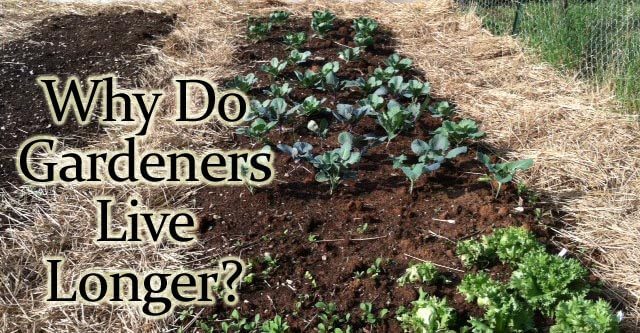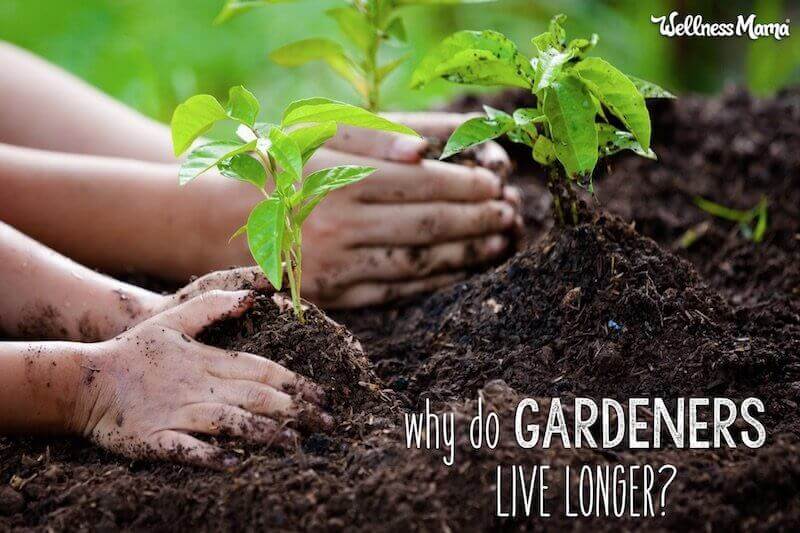There is a lot of evidence, most anecdotal, some scientific, about how gardeners live up to 14 years longer than non-gardeners. That’s a pretty impressive life extension and it certainly warrants further research.
National Geographic author Dan Buettner has studied this in depth by visiting what he called “blue zones” around the world- places where life expectancy is significantly longer. He studied these people and his findings are somewhat surprising. Watch a TED talk about his findings here.
Certainly, there are many factors involved, but I think there are some key things that gardeners do that could contribute to longer life:
1. Get Enough Vitamin D
Typically, gardening isn’t done at night, so while tending a garden, one is usually in the sun consistently. The body naturally produces Vitamin D from sun exposure, and since Vitamin D is protective against types of cancer and heart disease, it is logical that those with higher Vitamin D levels could live longer.
How to Get the Benefit: Even if you don’t garden, you can spend some time in the sun and get enough Vitamin D. Make sure to optimize these factors so that you are producing Vitamin D and not burning!
2. Play In the Dirt
Gardening, by its nature, means sticking your hands in the dirt. While our society shuns dirt and invents things like chemical hand sanitizer, dirt can actually be good for you! In fact, lack of dirt, and the soil borne organisms that come with it, has been linked to higher auto-immune disease.
Soil is an incredibly rich source of natural bacteria, minerals, and microorganisms. Touching the soil regularly exposes the body to beneficial (and small amounts of harmful) microorganisms that can boost the immune system. Since beneficial bacteria and gut health are so vital to overall health, it is logical that the immune boosting properties of dirt could increase longevity as well.
How to Get the Benefit: You can take probiotics and eat fermented foods, but you still won’t be exposed to the same variety of micro-organisms unless you get your hands dirty!
3. Getting Grounded
Gardeners spend time touching the earth and the soil. According to the book Earthing: The Most Important Health Discovery Ever, this alone could have tremendous benefit.
The theory is that many of us rarely or never touch the earth with bare skin, and certainly not for extended periods of time. This leads to a build up of positive electrons in the body from electrical energy, electromagnetic frequencies, WI-FI and more. The earth acts as a ground, just as it does for electrical outlets, reducing the extra positive charge.
The author speculates that this build-up and lack of contact with the earth can lead to inflammation and disease. Gardeners, by touching the earth are “grounding” themselves and removing this extra charge.
How to Get the Benefit: Walk around barefoot outside for at least 20 minutes a day or use an Earthing Mat when sleeping.
4. Stress Relief
Many gardeners cite relaxation and stress relief as reasons that they garden. Stress negatively affects hormones and increases risk of disease, so having a positive outlet for stress is tremendously beneficial for health. Balancing stress hormones has a positive effect on everything from blood pressure, to cortisol levels to inflammation.
How to Get the Benefit: Regularly make time to do something relaxing that you enjoy, preferably outside.
5. They Eat Vegetables
Logically, gardeners often grow vegetables, which means that logically, they also probably eat them. Consumption of more vegetables and less processed foods means more nutrients, antioxidants and less toxins. Win-win.
How to Get the Benefit: Eat a lot of vegetables… ’nuff said.
6. They Exercise
Lifting plants and soil, raking, and digging… it all requires low-level activity and weight lifting. These activities provide the positive benefits of exercise in a relaxing and sustainable way. Another win-win.
How to Get the Benefit: Every week, make time for exercises like heavy lifting and light exercise like swimming, hiking, or walking.
Do you garden? Why do you do it? Share below!





Leave a Reply